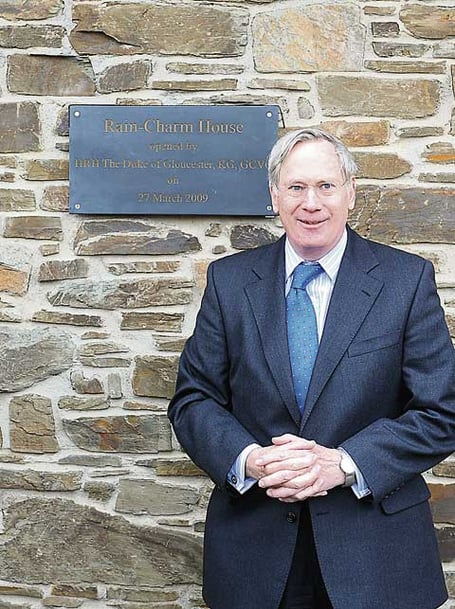HRH the Duke of Gloucester carried out the official naming ceremony for Rain-Charm House, the new offices of the Westcountry Rivers Trust at Stoke Climsland on Friday.
The building, a Duchy of Cornwall property, has been named Rain-Charm House in memory of WRT co-founder Ted Hughes who wrote the poem 'Rain Charm for the Duchy' to celebrate the birth of HRH Prince Harry. The Trust were thrilled that The Duke attended the opening ceremony making the event a memorable occasion.
The Duke was welcomed on arrival by children from the village primary school, then escorted into the building and introduced to WRT staff, trustees and guests to gain an insight into the work of this local, environmental charity.
The Director, Dr Bright gave an overview of the work of the trust and Toby Russell, Head of Fisheries, provided a short presentation of the ground breaking scientific research project that the trust undertook into Atlantic Salmon conservation. The Duke, escorted by Dr Bright, visited the Educational Marquee where children were taking part in practical educational activities that help them investigate and better understand river life.
The official naming ceremony took place at the front of the building, with The Duke unveiling a commemorative plaque commissioned in Cornish Delabole slate and His Royal Highness said a few words.
Michael Martin MBE, a founder and former chairman of the trust, presented HRH with a book of poems by the late Ted Hughes to commemorate the naming of the building. Dr Bright thanked His Royal Highness and special guests for attending the grand opening, and invited everyone to join him in a toast to the newly named Rain-Charm House.
The Westcountry Rivers Trust was founded by a group of friends, including the late Poet Laureate Ted Hughes, Anne Voss Bark, MBE, owner of the Arundell Arms Hotel, Michael Martin MBE, and others, all of whom were passionate conservationists who cared deeply about the rivers of the West Country. They noticed over a period of time that the integrity of the rivers had diminished and they decided to set up a charity which became the Westcountry Rivers Trust. The Rivers Trust model has now been rolled out across the country with 30 similar trusts throughout the UK and Ireland.
Since its inception, WRT has improved huge swathes of waterside habitat across the region; over 80,000ha of land in 17 catchments have received best farming practice guidance, 2,000km of river has been surveyed, and more than 250km of damaged river-bank restored to improve water quality and wildlife habitat.
Recently the trust has led a landmark Europe-wide research project on tracing salmon survival at sea, using genetic fingerprinting technology. Any salmon caught at sea can now be assigned to its river of origin in Europe by looking at its genetic profile. The work has been recognised by the North Atlantic Salmon Conservation Organisation (NASCO) and the Atlantic Salmon Trust as the cornerstone for the future management of salmon.
Continuing its efforts to remain practical and innovative, the trust is now pioneering work into the restoration and creation of wetland habitats as a carbon-offsetting tool. This will be used by local and regional businesses so they can address the impact their company has on the environment by reducing the volume of greenhouse gases in our atmosphere and in doing so tackle local issues of flooding, drought and biodiversity.





Comments
This article has no comments yet. Be the first to leave a comment.